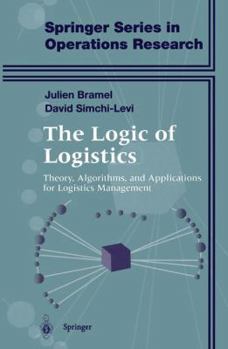The Logic of Logistics
Fierce competition in the global market provides a powerful motivation for developing ever more sophisticated logistics systems. This book, written for the logistics manager and researcher, presents a... This description may be from another edition of this product.
Format:Hardcover
Language:English
ISBN:0387949216
ISBN13:9780387949215
Release Date:January 1997
Publisher:Springer
Length:281 Pages
Weight:1.25 lbs.
Dimensions:0.8" x 6.4" x 9.5"
Customer Reviews
2 ratings
Rigorous overview of logistic modeling
Published by Thriftbooks.com User , 22 years ago
Logistics has always been an integral part of industry and the military, and with the advent of the Internet, it has taken on major importance. This book gives a rigorous introduction to the formalism of logistics, and as such is fascinating reading for anyone interested in this area. Even individuals not into supply chain management and logistics engineering, and interested merely in the mathematics, will find this book interesting. After a short overview of logistics in the introduction, the authors discuss worst-case analysis of various algorithms for the bin-packing and traveling salesman problems. They define two performance metrics to measure the worst-case effectiveness: the absolute and asymptotic performance ratios. The First-Fit, Best-Fit, First-Fit Decreasing, and Best-Fit Decreasing heuristics are discussed in detail for the bin-packing problem. The authors show that a polynomial time heuristic cannot have an absolute performance ratio less than 3/2. They also show that finding a heuristic for the traveling salesman problem with a constant worst-case bound is as difficult as solving any NP-complete problem. The minimum spanning tree based, nearest insertion, Christofides', and local search heuristics are all discussed in great detail. The next chapter considers the probabilistic analysis of algorithms via the characterization of the average performance of a given heuristic. The analysis is asymptotic with large problem sizes needed. Again, the bin-packing and traveling salesman problems are considered for studying this approach. This is followed by an approach to studying the efficacy of a particular heuristic by using mathematical programming in the next chapter. The strategy here is to cast the (NP-complete) problem as an integer problem, and then relax the constraint of integrality and solve the linear program. The authors showthat tight lower bounds can be found for these integer programs. The authors switch gears somewhat in the next two chapters, where vehicle routing problems are studied. In particular, the single-depot capacitated vehicle routing problem with equal and unequal demands is analyzed via worst-case and probabilistic analysis. The analysis is generalized in chapter 7 for the case where time constraints are present. An analytical solution of this problem, called the vehicle routing problem with time windows, is considered in detail by the authors. They back up their analysis with computational results at the end of the chapter. In chapter 8, a column generation approach is employed to solve the vehicle routing problem. No time constraints are put in, and the authors give in detail the steps behind this technique. The study of inventory models is begun in chapter 9, with the economic lot size model leading off the discussion. This model illustrates effectively the tradeoffs between ordering and storage costs, and the optimal ordering policy is found. This model is generalized to the case where fin
Get this book or spend a month in library
Published by Thriftbooks.com User , 23 years ago
Professor Simchi-Levi dedicates his time as co-author of this book and I'd like to thank to his effort. The logic of Logistics is only "ONE' book in current academic text books that bravely delineates the theory and algorithm; while most other books spends many hundread pages for "words" and "case studies". The models are showed with algorithm and proving. Examples are included as necessary. The way to illustrate case study is different -but good different. For a researcher, consulting companies, professors, graduate students, you can spend a month in library for literature reviews or take few days to go through this book. If you think your time is worth, grasp this book and you won't be disappointed. If you want to see less mathematic issue, you may want to look at another book of Simchi-Levi. It's "Designing and Managing the Supply Chain : Concepts, Strategies, and Cases".





